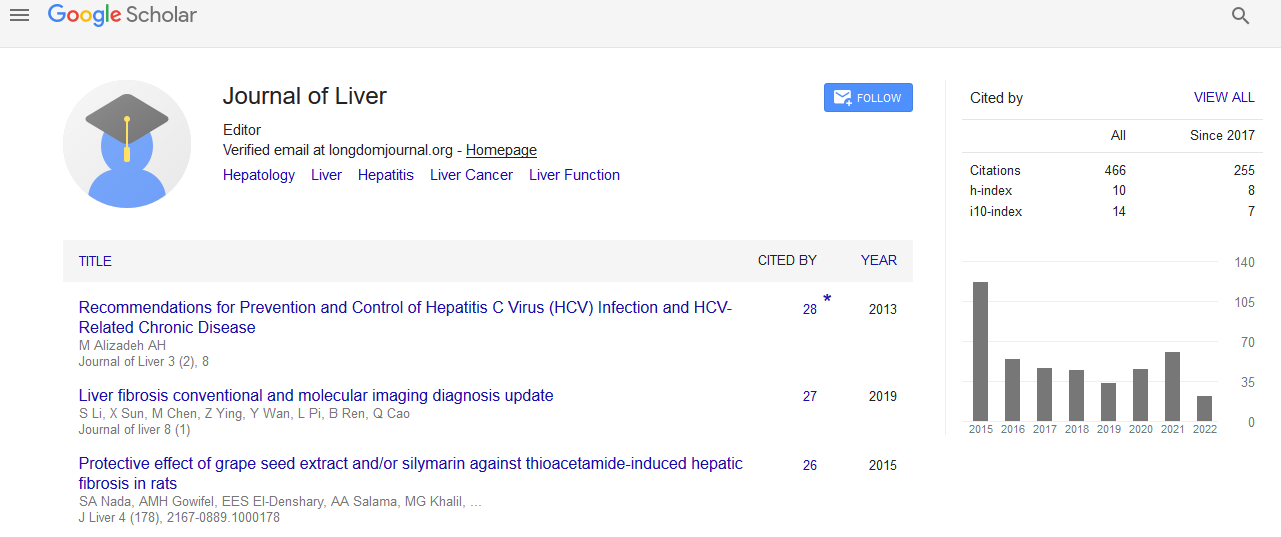PMC/PubMed Indexed Articles
Indexed In
- Open J Gate
- Genamics JournalSeek
- Academic Keys
- RefSeek
- Hamdard University
- EBSCO A-Z
- OCLC- WorldCat
- Publons
- Geneva Foundation for Medical Education and Research
- Google Scholar
Useful Links
Share This Page
Journal Flyer

Open Access Journals
- Agri and Aquaculture
- Biochemistry
- Bioinformatics & Systems Biology
- Business & Management
- Chemistry
- Clinical Sciences
- Engineering
- Food & Nutrition
- General Science
- Genetics & Molecular Biology
- Immunology & Microbiology
- Medical Sciences
- Neuroscience & Psychology
- Nursing & Health Care
- Pharmaceutical Sciences
Functional genomics identified a novel cell-cell contact inhibition mechanism involved in Hepatocarcinogenesis
World Congress on Hepatitis
July 20-22, 2015 Orlando, Florida, USA
Sen-Yung Hsieh, Rabindranath Bera and Chih-Yung Chiou
Scientific Tracks Abstracts: J Liver
Abstract:
It is unclear how proliferating cells elicit suppression on cell proliferation and how cancer cells evade this growth suppression. Using a loss-of-function screening of the human kinome and phosphatome to identify genes suppressing tumor initiation in human hepatocellular carcinoma (HCC), we identified 19 genes and characterized one of the top scoring tumor suppressor candidate, Protein Tyrosine Phosphatase Receptor type F (PTPRF). We found that PTPRF was induced during cell proliferation by cell-cell contact. Ectopic expression of wild-type PTPRF, but not the phosphatase-inactive mutant, suppressed cell proliferation and colony formation in soft-agar assays. In contrast, PTPRF silencing led to cell hyperproliferation, enhanced tumor colony formation in soft-agar, and increased xenograft tumor growth in nude mice. Mechanistically, PTPRF silencing showed aberrant ERK-dependent signaling including the phosphorylation/stabilization of MYC through the direct activation of SRC and suppression of PP2A. This PTPRF-mediated growth suppression during cell proliferation functioned independently of the Hippo-Yap pathway. Clinically, PTPRF was downregulated in 42% HCC (37/89), 67% gastric cancer (27/40), and 100% colorectal cancer (40/40). PTPRF upregulation was found in 24% HCC (21/89) and associated with better clinical outcomes. Conclusion: A novel PTPRF-mediated growth suppression pathway was identified via a functional genomics screening in human hepatoma cells. Induction of PTPRF by cell-cell contact during cell proliferation quenched the activated ERKdependent proliferation signaling to prevent cell hyperproliferation and tumor initiation. PTPRF downregulation in HCC facilitated tumor development. Our findings have shed light on how cancer cells can evade growth suppression and open a new avenue for future development of anticancer therapies.
Biography :
Sen-Yung Hsieh earned his MD degree from the National Yang Ming University in 1983, and obtained his PhD in Molecular Virology and Pathology from University of Pennsylvania in 1991. He received his clinical training in internal medicine, and subsequent a specialty in hepatogastroenterology in Chang Gung Memorial Hospital, Linko, Taiwan. He initially focused on the molecular virology and epidemiology of human hepatitis viruses. His team for the first time identified the zoonotic transmission of hepatitis E virus from swine to humans in 1998, which was later found in other wild and domestic animals as natural reservoirs for sporadic hepatitis E in Japan, western countries, and other parts of the world. Currently, he is interested in elucidation the molecular mechanisms involving in carcinogenesis of human hepatoma. By integration of both functional genomics and molecular and cellular biology, he has identified novel oncogenes, tumor suppressor genes, and pathways that play significant roles in oncogenesis of human hepatoma. His works have been published in J Virology, Nucleic Acid Res, PNAS, Cancer Research, Oncogene, Proteomics, J Proteome Res, Mol Cell Proteomics, J Hepatology, and Hepatology. His main research field is Hepatocellular carcinoma: Carcinogenesis mechanisms, diagnosis, and treatments.

